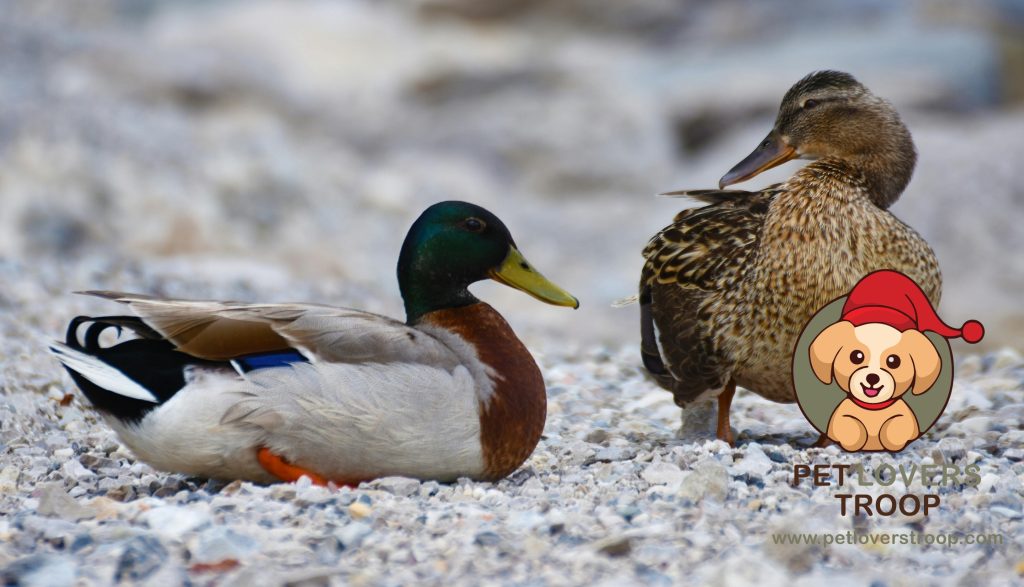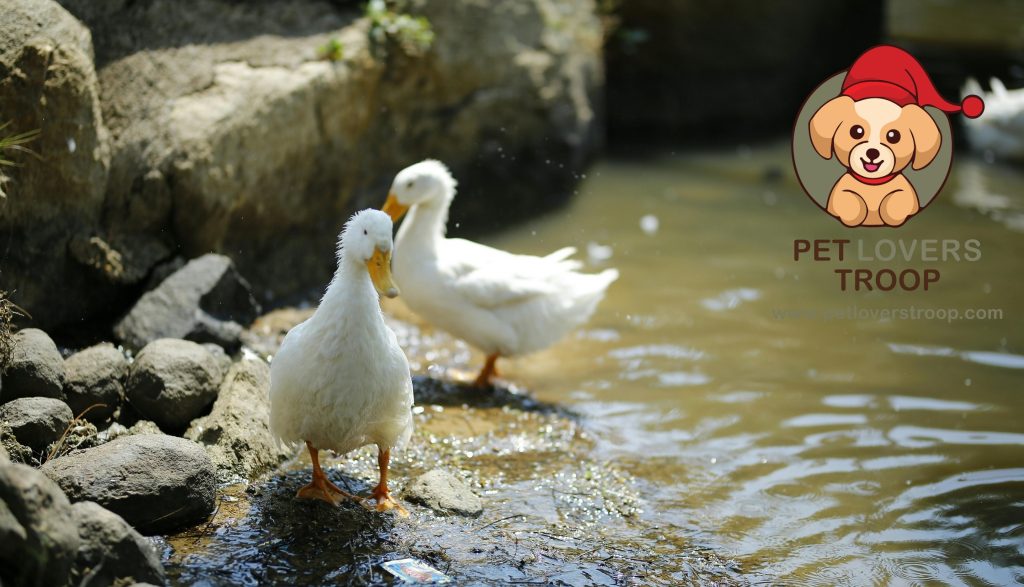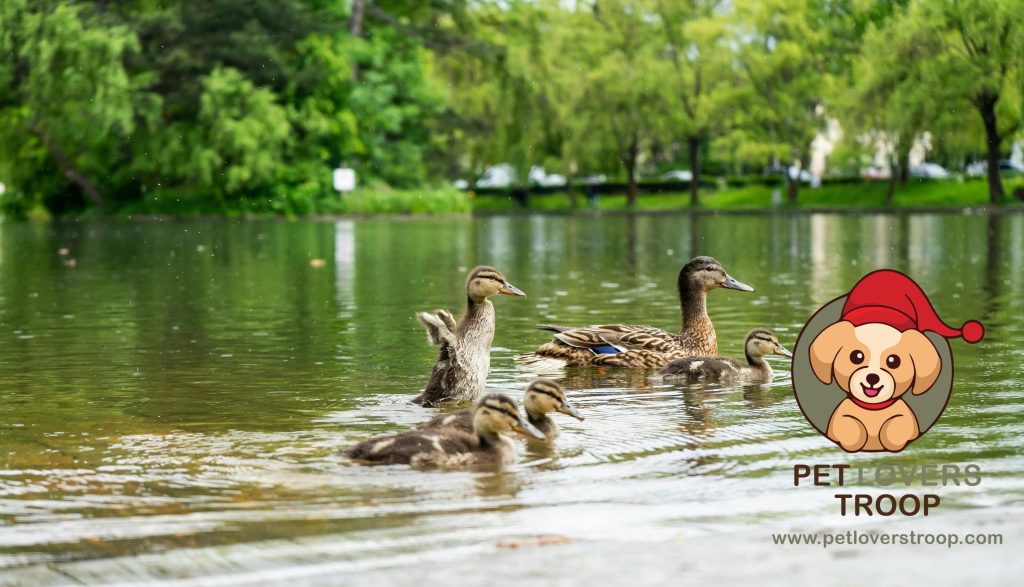Ducks are extremely tough, affordable, and easy to care for. They make very kind and entertaining pets and they can have an average lifespan of up to 20 years. Although baby ducklings sometimes find their way into gift baskets, they can turn into beloved family members with only little preparation, knowledge, and compassion.
For anyone who might be wondering about keeping a duck as a pet, here is some useful information.
Read more on: Are Ducks Good Pets?
All About Ducks
There are four major kinds of ducks: domestic, dabbling, diving, and sea ducks. This article emphasizes the first type, domestic ducks
The term “domestic duck” refers to domesticated ducks that were bred in captivity, either for practical purposes like producing meat or laying eggs, or, in the instance of the loud Call duck, for wildfowling, which refers to the practice of chasing wild ducks and geese to lure wild ducks.
Check out: The Ultimate Guide to Choosing the Right Duck Feed
The final three kinds of duck are referred to as ‘Ornamental Wildfowl’, and they spend most of their time on the water. Therefore, the birds require a suitable pond or lake, as well as a neighboring habitat, to nest. Wildfowl’s wings must be pinned or simply their enclosure should be netted to prevent them from flying away and mixing with native duck species.

Types of Pet Ducks
If you are interested in keeping ducks as pets here are some species that’d make an excellent pet.
- Mallard ducks
- Indian Runner ducks
- Call ducks
- Pekin ducks
- Cayuga ducks
- Harlequin ducks
- Rouen ducks
- Swedish ducks
- Mandarin ducks
Have a look at: Bird Lifespan: How to Care for a Long-Term Feathered Friend
Ducks as Pets
Ducks are very sensitive and intelligent animals. If you communicate with them, they can follow instructions, play games, play with toys, kiss, and demand cuddles just like other birds. From a young age, ducks will become extremely social with humans if they are treated regularly and carefully.
You are going to gradually discover what kinds of activities your duck likes, however it may require some getting used to. You and your pet duck will become closer the more you spend time together.
Know more about: Bird Nutrition Basics: What to Feed your Pet Bird for a Balanced Diet
Duck House
You’re going to need a fully enclosed, predator-free house for your ducks.
Ducks cannot get up and perch like other animals such as chickens so height is unimportant. You do need to take into account setup and space on the floor.
You’ll most likely want to leave water in the Duck house, so make sure the flooring and bedding are waterproof. To protect your flooring from water damage, think about applying linoleum, tarps, or a rubberized floor coating.
Check out: The Black Bird Blues: The Pros and Cons of Owning a Raven as a Pet
On top of the waterproof flooring, add a layer of absorbent material which can be soft wood chips or recycled paper.
Secured Yard
You need to create a safe area for your pet ducks to play when they are not in the duck house. Having a fenced yard is the strongest answer, but keep in mind that in their free time, they still should be supervised because the risk of predators remains, even with the fencing.
Read more: The Complete Guide to Raising Ducks for Beginners
Along with securing a fenced yard, pet ducks should also have a secure, enclosed location where they can be safe when you aren’t looking after them. Even if you live in the city, surround this area with an electric fence and hawk netting. Pet ducks can attract a wide range of predator species.
Water Tub
Ducks enjoy swimming, splashing, drinking, and bathing. Everything in their existence revolves around water, and therefore the larger the bathtub, the better.
Read more on: Are Pigeons Good Pets?
Note that ducks foul their water very quickly, so the tub must be changed daily sometimes even multiple times a day. You’ll want to pick a tub that is large enough for your ducks to swim in while being small enough to clean effortlessly.

How to Take Care of Your Duckling?
During the first three to four weeks, ducklings must be kept warm and dry. Place a box or cage in a warm area (about 80-85°F, or 30°C), or use a light bulb to provide heat. They must be able to move in and out of the heat whenever they feel necessary, so place the lamp in a corner of their enclosure rather than in the center.
Check out: Eclipse Safety for Cats: How to Keep Your Furry Friends Safe
Never leave them unattended near water where they can climb because they could get cold and drown.
What to Feed Your Ducks and Ducklings
Adult Ducks
Adult ducks can be fed wheat and layer pellets. Pellets can be stored in a hopper outside with a rain bonnet or hung inside if there is free space but they must be kept dry in any case.
Drakes or ducks that aren’t breeding will consume more wheat and fewer pellets while breeding ducks need the extra calcium included in the pellets to create eggs, so make sure they have the supply of pellets as needed.
Read more on: The Flea Fiasco: How Long can these Pesky Pests Survive Without their Favourite Hosts?
Layer mash is not suitable for ducks because when mixed with water, it gets lodged in their bills, therefore it must be avoided.
Ducklings
For the initial fourteen days, the ducklings should be fed duck starter, a specialized ration for young birds. From weeks 3 to 7, ducklings should be fed a duck grower, which is excellent for growth and development. After that, you can feed a pullet grower, a low-protein, unmedicated chicken feed.

Important Things to Note Before Adopting Ducks
Ducks are demanding pets. There’s a lot of cleaning to be done, and it is always wet and stinky. For example, ducks require plenty of fresh water yet frequently foul it. So you’ll be spending a lot of time cleaning their water.
Know more about: Beginners Guide to Choosing the Right Birdcage
Pet ducks are generally unable to fly, making them a prime target for local wildlife predators such as coyotes, birds of prey, and even stray cats. This calls for you to provide hawk covers, which should be set up over their pens. When outside, your pet ducks have to be supervised and kept safe from predatory attacks.
You should additionally offer more warmth in their environment, like covering them with a straw on the coop floor. Wooden plants, benches, and stumps are also effective at keeping ducks off the ground.
Insulate your duck house with bundles of hay along the interior walls. This will decrease the amount of cold air that can come through and allow them to keep warm in their duck house.
Read more: Pet-Friendly DIY Projects: Creating Customized Accessories for Your Pets
Pet ducks can be noisy, especially when they want something. Neighbors may not adore the passionate quacks as much as you do.
FAQs
What is the average lifespan of a duck?
Pet ducks have a lifespan of about 10 to 15 years with proper care. Some ducks can survive for up to 20 years, especially if they eat well, have a stable home, and engage in regular social activities.
Can ducks fly?
Many domestic ducks have limited flying ability, but some breeds, like Muscovy, Call, and East Indie ducks, and also some Mallards, can take short flights. Wing clipping is frequently recommended for breeds that can fly to keep them safely contained.
Where can you buy pet ducks?
Pet ducks are available from a number of sources. You can buy ducklings through hatcheries and farms and local feed stores sometimes carry them during specific seasons. Some private breeders also sell pet ducks.
Do ducks need regular companionship?
Yes, ducks are social creatures. It makes them happy when they have a buddy around. Having at least two ducks is suggested because they love each other’s company and are naturally more relaxed and happy in pairs or small groups. Without companionship, a solitary duck may feel alienated and stressed.
How messy do pet ducks get?
Ducks are known for becoming a little messy, especially with their water. They enjoy splashing and often transform the water into dirt. So, their water needs to be changed on a regular basis, and their living space needs to be cleaned frequently to be dry and comfortable. Ducks may need more cleaning than other pets, but they are also entertaining and interactive.
What sort of shelter do pet ducks need?
Ducks need a secure home to protect them from predators and harsh weather. They don’t need a tall house, but they do want an entirely enclosed room with waterproof flooring and soft bedding like wood shavings or straw. Adding a small pool or tub nearby for bathing can keep them happy because water is essential to their health.
Can ducks get along with other animals?
Ducks can coexist peacefully with other small animals, such as chickens, but they should be kept away from dogs and cats because they see them as prey. If you have other pets, make sure your ducks have enough space to explore safely.
